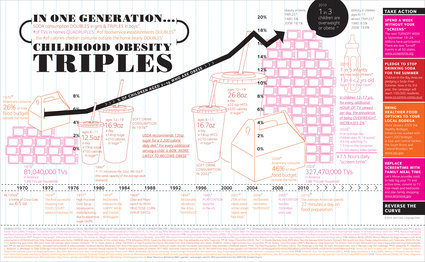
What employers can do about childhood obesity
Some issues are just too important to ignore—childhood obesity is one of them. Our friend Fran Melmed has been writing about children, the food industry and why employers should care.
This post originally ran in her newsletter. We especially love the list of what employers can do!
Our Kids vs. The Food Industry
The stats on the number of kids facing obesity and the related chronic conditions are staggering. This may be the first generation not to outlive their parents. This is definitely the first generation to experience obesity-related chronic conditions at a much earlier age. Our childhood obesity crisis has caught many people’s attention, prompting movements like Jamie Oliver’s Food Revolution, Michelle Obama’s Let’s Move campaign, the CDC’s Childhood Obesity Demonstration Project and many farm-to-school programs, to name a few.
All of this gathering steam is being met by a mighty pushback from the food industry. Marion Nestle, a professor of nutrition and food studies at New York University, discussed the Let’s Move campaign’s change in language:
“In what Obama Foodorama calls ‘a fundamental shift in the Let’s Move campaign,’ Michelle Obama announced in a speech last week that she will now focus on getting kids to be more active. Apparently, she has given up on encouraging food companies to make healthier products and stop marketing junk foods to kids.
“Activity is important for health, but to lose or maintain weight, kids also need to eat less. Sometimes they need to eat much less. And discouraging them from drinking sugary sodas is a good first step in controlling body weight.
“But eating and drinking less are very bad for business. Food companies do all they can to oppose this advice.”
Just how bad changing our kids’ diet is for the food industry’s bottom line was made painfully clear in a recent New York Times article, that highlighted the profit motive behind our public school lunch programs:
“An increasingly cozy alliance between companies that manufacture processed foods and companies that serve the meals is making students—a captive market—fat and sick while pulling in hundreds of millions of dollars in profits. At a time of fiscal austerity, these companies are seducing school administrators with promises to cut costs through privatization. Parents who want healthier meals, meanwhile, are outgunned.”
Marion Nestle and this editorial go on to describe ways the food industry has worked the system in their favor and against kids’.
Why Should Employers Care?
The system also works against employers. Many employers don’t consider kids to be their priority, or even their concern. After all, workers leave for new jobs, taking their kids with them. And not many companies are multi-generational anymore. But there are plenty of reasons why employers should care about childhood obesity.
Most obviously because it affects employers’ health care budget, particularly now that “children” can stay on their parents’ employer-provided health care plan up until age 26. According to the National Business Group on Health, children and adolescents are responsible for 14.7% of an employer’s health care costs, and obese children have much higher health care utilization.
Medical expenditures aren’t the only costs. Obese children also miss more days of school and have greater emotional challenges. These situations take parents away from work, or distract them while they’re there. Because parents care about their children’s well-being but don’t often know what to do, helping them do something about it also positively affects parents’ health behavior and their sense of loyalty to their company.
Once these children grow up, they of course join our workforce. Employers should be concerned that their future talent’s going to walk in the door with a slew of health concerns and conditions.
Finally, there are consumer habits to consider, and brand management, if we’re being candid. Studies show that consumers select whom they’ll shop with and recommend based on how that company affects their community’s and their employees’ health. Employers can influence their customers’ habits and their social standing by caring about childhood obesity.
What Can Employers Do?
Employers have more tools at their disposal than they may think. They can:
- Review their benefits plans’ services and eligibility to make sure kids can access available counseling and programs
- Expand their wellness programs’ eligibility and incentive structure to also include kids
- Design specific interventions and challenges to focus on kids’ interests and rewards
- Create more family-based events and educational experiences to collaborate with parents in their efforts
- Join local and state conversations about food lunch programs, food access, neighborhood walkability, etc.
- Give to organizations that increase access to food, improve school lunches or in other ways support this mission.
For more ideas, look through the National Business Group on Health’s employer toolkit for childhood obesity.
Thanks to Fran for letting us share this post! You can check out Fran’s blog Free-Range Communication and follow her on Twitter @femelmed.
Work with Us
We partner with organizations that value their people first. Let’s talk.

Jennifer Benz, SVP Communications Leader, has been on the leading edge of employee benefits for more than 20 years and is an influential voice in the employee benefits industry.


